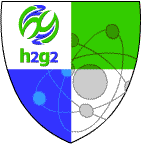Topography of The Netherlands
Created | Updated Sep 2, 2012

The Netherlands: Introduction | Topography | Facts and Figures |
Polders and Dykes | The Dutch National Anthem | Dutch - the Language | Dutch Pronunciation | Dutch Grammar | Handy Dutch Phrases |
The Dutch | Transportation in the Netherlands
The Netherlands is a small country in the north of Western Europe. It is often called Holland - this is, of course, totally incorrect as will be explained later. The Netherlands borders Germany on the east and Belgium on the south. It boasts 16 million inhabitants (as of 2001) in only 33,889 square kilometres, making it one of the most densely populated countries in the world. Half of the land was reclaimed from the sea, and the country is mostly flat and below sea level. The sea is prevented from flooding this land by a protective system of dykes.
The capital of the Netherlands is Amsterdam, but the seat of government is in Den Haag or 's-Gravenhage (The Hague).
Provinces
The Netherlands has 12 provinces. They are:
- Drenthe, capital Assen
- Flevoland, capital Lelystad
- Friesland, capital Leeuwarden
- Gelderland, capital Arnhem
- Groningen, capital Groningen
- Limburg, capital Maastricht
- Noord-Brabant, capital 's-Hertogenbosch or Den Bosch
- Noord-Holland, capital Haarlem
- Overijssel, capital Zwolle
- Utrecht, capital Utrecht
- Zeeland, capital Middelburg
- Zuid-Holland, capital 's-Gravenhage or Den Haag
The Northern Provinces
Drenthe, Groningen, Friesland and Overijssel are the Northern Provinces in the Netherlands. They are traditionally more agricultural than the other provinces. Some Dutch refer to these four as 'a bit behind', but these provinces are slowly making a comeback - Groningen and Assen especially are growing fast.
Groningen is slowly becoming one of the bigger ICT (Information and Communication Technology) centres in the Netherlands. It also boasts one of the biggest universities in the country. Assen is mainly growing with young families who start out in the quieter areas, but are still near enough to Groningen.
The Randstad
The Randstad (literally 'the edge city') is the major industrial and commercial centre of the Netherlands. It includes the provinces Zuid and Noord-Holland, and Utrecht. The four major cities in the Netherlands - Amsterdam, Rotterdam, Utrecht and Den Haag are in the Randstad.
Flevoland
Flevoland is the youngest of the Dutch provinces, having been formed in the 1980s. Before that time the polders were each part of different provinces. It consists only of polders reclaimed from the sea, and as little as 50 years ago it was all under water. For more information on Polders see Polders and Dykes in the Netherlands.
Flevoland consists of the Noordoostpolder, Noordelijk Flevoland and Zuidelijk Flevoland. These polders where laid dry in 1942, 1957, and 1968 respectively. Its purpose was to provide agricultural land, but the main city of Flevoland in the Zuidelijke Flevopolder, Almere is rapidly expanding due to the need for urban space in the north of the Randstad.
Main Ports
The Netherlands is a country that lives on transport. It has Rotterdam - one of the major seaports of Europe - and Schiphol, one of the biggest airports, near Amsterdam. It is often called the 'Gateway to Europe'.
The Netherlands holds this position due to that fact that three major rivers run into the sea within its borders. These are the Rhine, the Maas and the Schelde. The Rhine also runs through Germany and ships can deliver produce to and from the major industrial areas there. The Maas and Schelde run through Belgium, where there is also a lot of industry.
Why the Netherlands is not 'Holland'
Zuid-Holland and Noord-Holland (south and north Holland) together form 'Holland'. So when people talk about Holland to the Dutch they are only talking about two provinces out of the 12. It would be like saying to an American 'So you come from Carolina?', meaning the United States. This is not a nice thing to do and most Dutch will be offended by it.

